Developing Manager Report: Leadership Styles at Visit London, Analysis
VerifiedAdded on 2020/02/05
|15
|4516
|31
Report
AI Summary
This report examines the development of managers within the context of the travel and tourism industry, specifically using Visit London as a case study. It explores various management styles, including autocratic and democratic approaches, and analyzes the leadership characteristics essential for effective management. The report also delves into communication methods employed by managers, organizational culture, and the importance of managerial skills performance. A SWOT analysis is conducted to assess personal skills, and the report outlines the process of setting priorities, objectives, and targets for personal development. Furthermore, it addresses the crucial aspects of leading and motivating a team, the process of managerial decision-making, and how managerial and personal skills support career development, concluding with a look at career and personal development needs.
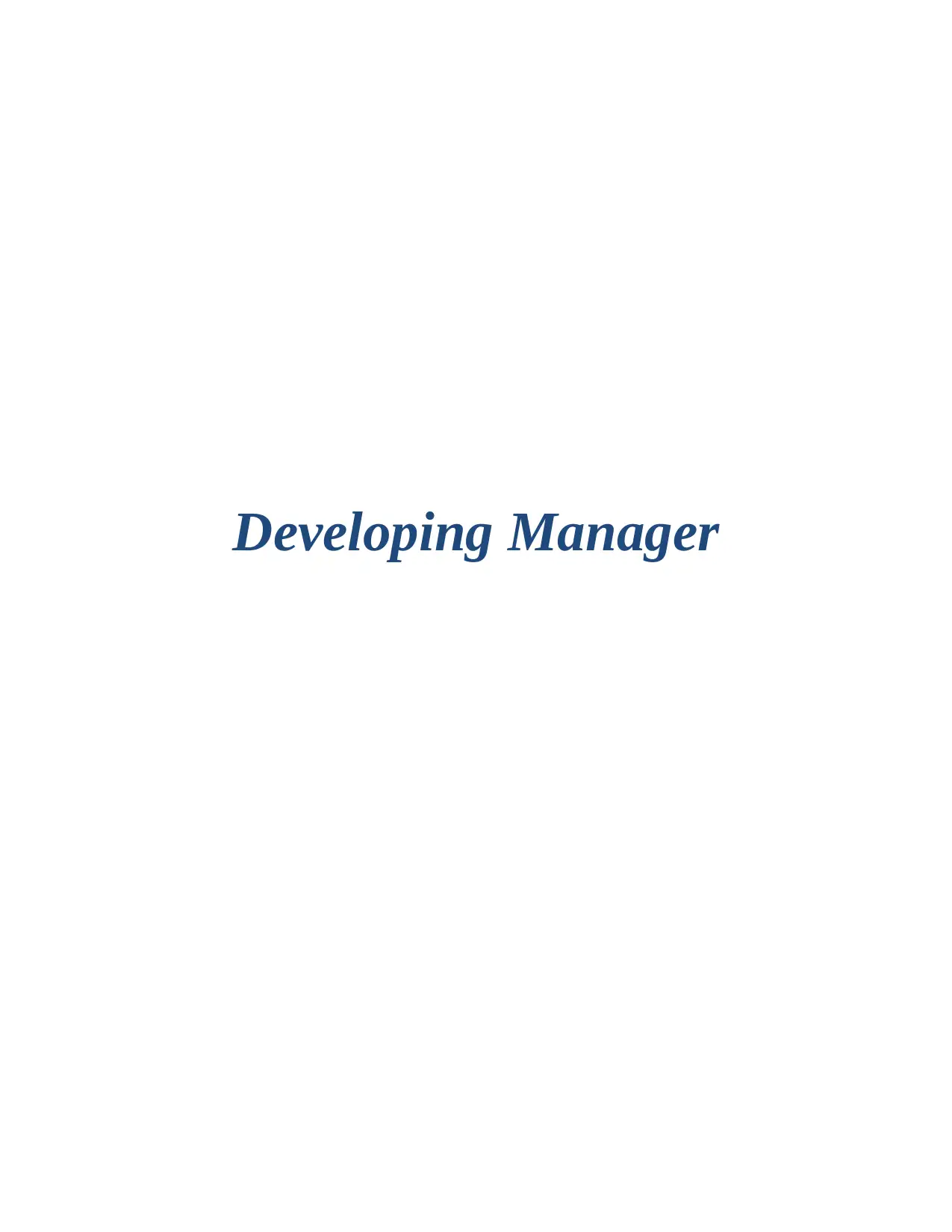
Developing Manager
Paraphrase This Document
Need a fresh take? Get an instant paraphrase of this document with our AI Paraphraser
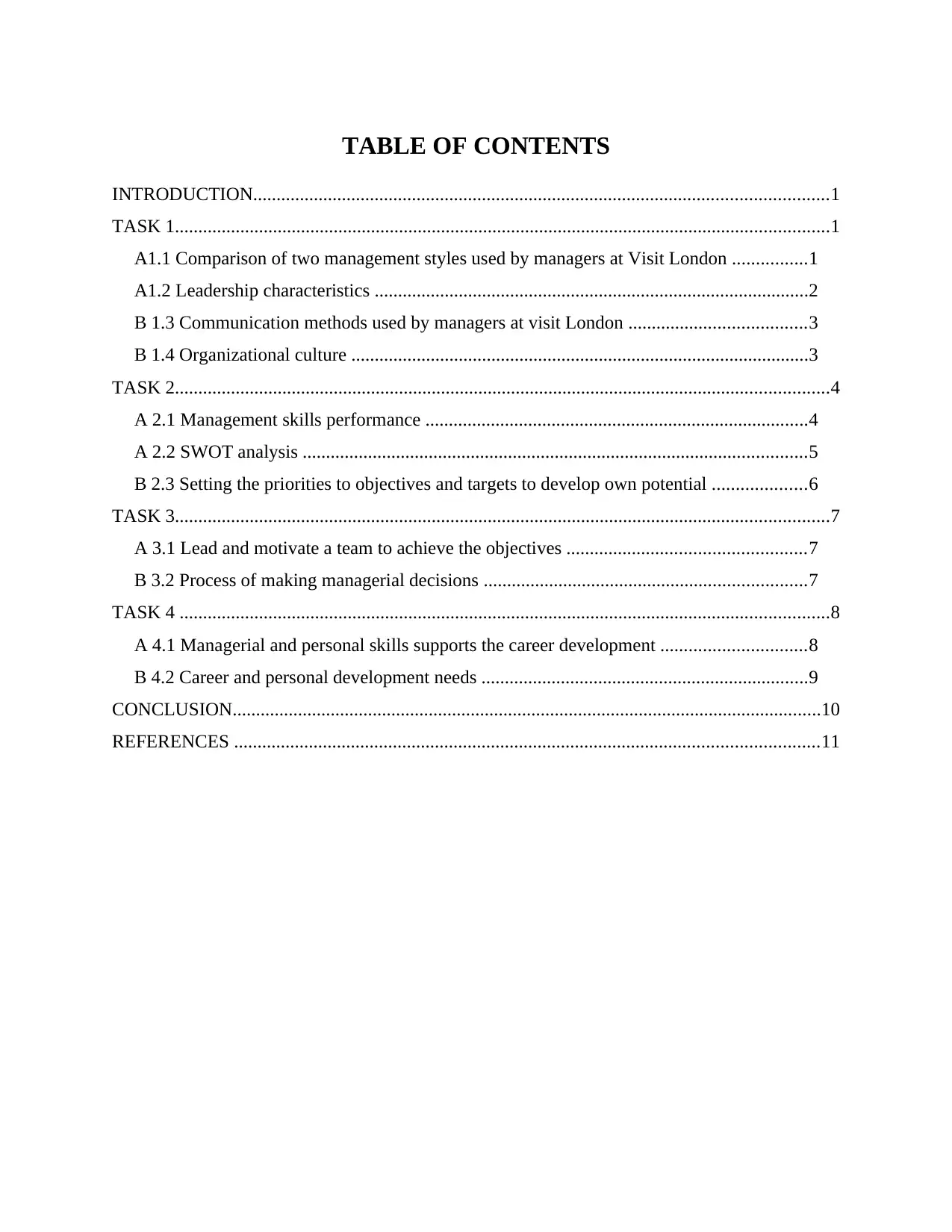
TABLE OF CONTENTS
INTRODUCTION...........................................................................................................................1
TASK 1............................................................................................................................................1
A1.1 Comparison of two management styles used by managers at Visit London ................1
A1.2 Leadership characteristics .............................................................................................2
B 1.3 Communication methods used by managers at visit London ......................................3
B 1.4 Organizational culture ..................................................................................................3
TASK 2............................................................................................................................................4
A 2.1 Management skills performance ..................................................................................4
A 2.2 SWOT analysis ............................................................................................................5
B 2.3 Setting the priorities to objectives and targets to develop own potential ....................6
TASK 3............................................................................................................................................7
A 3.1 Lead and motivate a team to achieve the objectives ...................................................7
B 3.2 Process of making managerial decisions .....................................................................7
TASK 4 ...........................................................................................................................................8
A 4.1 Managerial and personal skills supports the career development ...............................8
B 4.2 Career and personal development needs ......................................................................9
CONCLUSION..............................................................................................................................10
REFERENCES .............................................................................................................................11
INTRODUCTION...........................................................................................................................1
TASK 1............................................................................................................................................1
A1.1 Comparison of two management styles used by managers at Visit London ................1
A1.2 Leadership characteristics .............................................................................................2
B 1.3 Communication methods used by managers at visit London ......................................3
B 1.4 Organizational culture ..................................................................................................3
TASK 2............................................................................................................................................4
A 2.1 Management skills performance ..................................................................................4
A 2.2 SWOT analysis ............................................................................................................5
B 2.3 Setting the priorities to objectives and targets to develop own potential ....................6
TASK 3............................................................................................................................................7
A 3.1 Lead and motivate a team to achieve the objectives ...................................................7
B 3.2 Process of making managerial decisions .....................................................................7
TASK 4 ...........................................................................................................................................8
A 4.1 Managerial and personal skills supports the career development ...............................8
B 4.2 Career and personal development needs ......................................................................9
CONCLUSION..............................................................................................................................10
REFERENCES .............................................................................................................................11
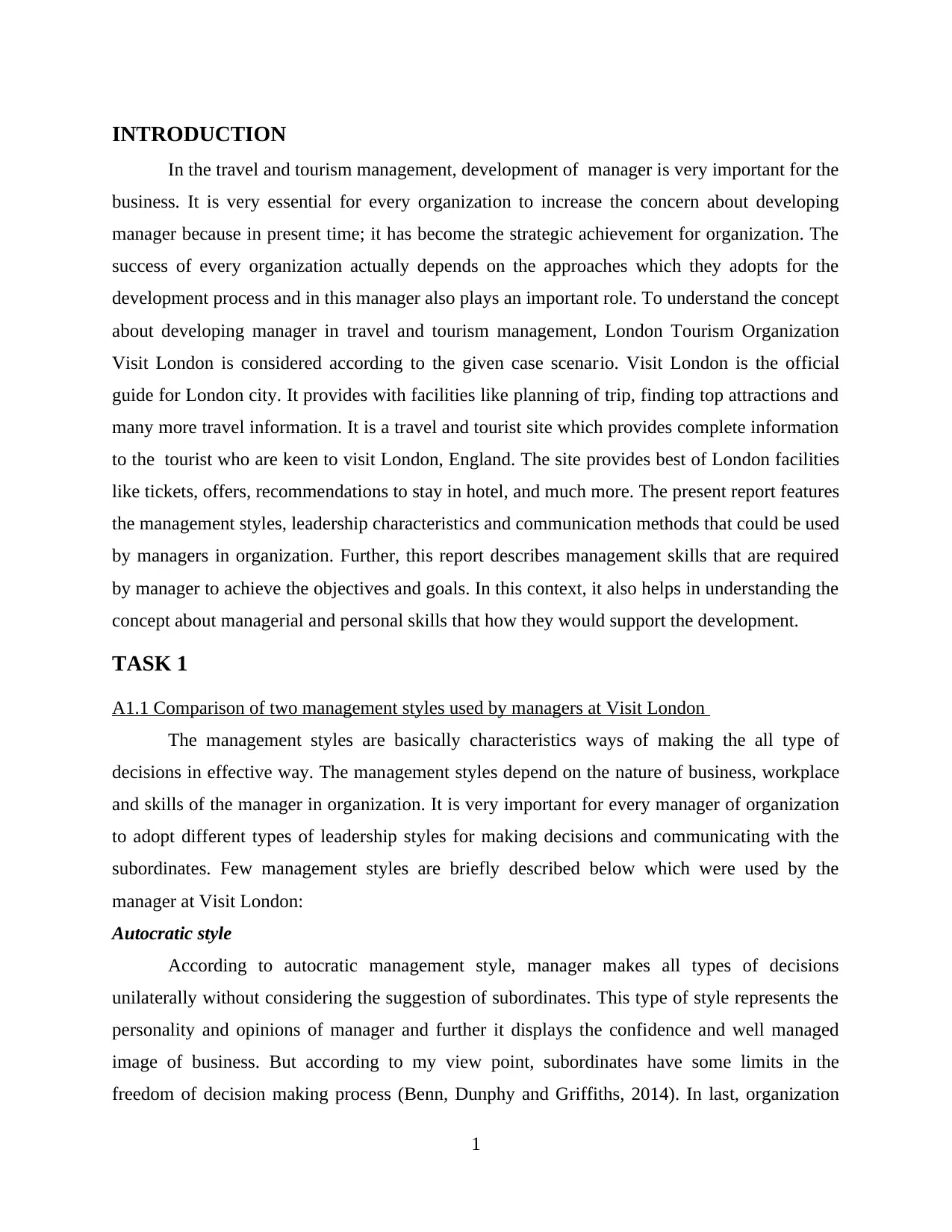
INTRODUCTION
In the travel and tourism management, development of manager is very important for the
business. It is very essential for every organization to increase the concern about developing
manager because in present time; it has become the strategic achievement for organization. The
success of every organization actually depends on the approaches which they adopts for the
development process and in this manager also plays an important role. To understand the concept
about developing manager in travel and tourism management, London Tourism Organization
Visit London is considered according to the given case scenario. Visit London is the official
guide for London city. It provides with facilities like planning of trip, finding top attractions and
many more travel information. It is a travel and tourist site which provides complete information
to the tourist who are keen to visit London, England. The site provides best of London facilities
like tickets, offers, recommendations to stay in hotel, and much more. The present report features
the management styles, leadership characteristics and communication methods that could be used
by managers in organization. Further, this report describes management skills that are required
by manager to achieve the objectives and goals. In this context, it also helps in understanding the
concept about managerial and personal skills that how they would support the development.
TASK 1
A1.1 Comparison of two management styles used by managers at Visit London
The management styles are basically characteristics ways of making the all type of
decisions in effective way. The management styles depend on the nature of business, workplace
and skills of the manager in organization. It is very important for every manager of organization
to adopt different types of leadership styles for making decisions and communicating with the
subordinates. Few management styles are briefly described below which were used by the
manager at Visit London:
Autocratic style
According to autocratic management style, manager makes all types of decisions
unilaterally without considering the suggestion of subordinates. This type of style represents the
personality and opinions of manager and further it displays the confidence and well managed
image of business. But according to my view point, subordinates have some limits in the
freedom of decision making process (Benn, Dunphy and Griffiths, 2014). In last, organization
1
In the travel and tourism management, development of manager is very important for the
business. It is very essential for every organization to increase the concern about developing
manager because in present time; it has become the strategic achievement for organization. The
success of every organization actually depends on the approaches which they adopts for the
development process and in this manager also plays an important role. To understand the concept
about developing manager in travel and tourism management, London Tourism Organization
Visit London is considered according to the given case scenario. Visit London is the official
guide for London city. It provides with facilities like planning of trip, finding top attractions and
many more travel information. It is a travel and tourist site which provides complete information
to the tourist who are keen to visit London, England. The site provides best of London facilities
like tickets, offers, recommendations to stay in hotel, and much more. The present report features
the management styles, leadership characteristics and communication methods that could be used
by managers in organization. Further, this report describes management skills that are required
by manager to achieve the objectives and goals. In this context, it also helps in understanding the
concept about managerial and personal skills that how they would support the development.
TASK 1
A1.1 Comparison of two management styles used by managers at Visit London
The management styles are basically characteristics ways of making the all type of
decisions in effective way. The management styles depend on the nature of business, workplace
and skills of the manager in organization. It is very important for every manager of organization
to adopt different types of leadership styles for making decisions and communicating with the
subordinates. Few management styles are briefly described below which were used by the
manager at Visit London:
Autocratic style
According to autocratic management style, manager makes all types of decisions
unilaterally without considering the suggestion of subordinates. This type of style represents the
personality and opinions of manager and further it displays the confidence and well managed
image of business. But according to my view point, subordinates have some limits in the
freedom of decision making process (Benn, Dunphy and Griffiths, 2014). In last, organization
1
⊘ This is a preview!⊘
Do you want full access?
Subscribe today to unlock all pages.

Trusted by 1+ million students worldwide
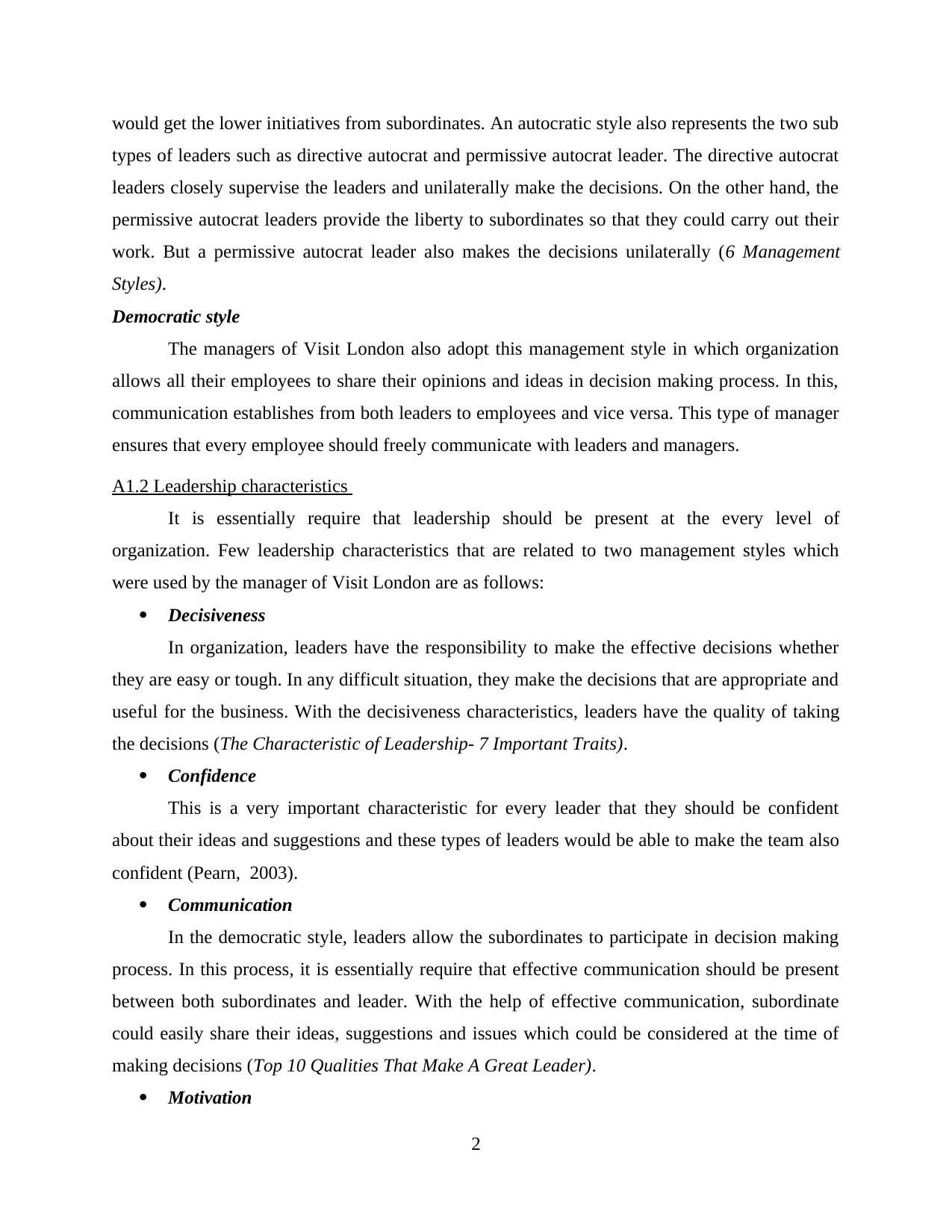
would get the lower initiatives from subordinates. An autocratic style also represents the two sub
types of leaders such as directive autocrat and permissive autocrat leader. The directive autocrat
leaders closely supervise the leaders and unilaterally make the decisions. On the other hand, the
permissive autocrat leaders provide the liberty to subordinates so that they could carry out their
work. But a permissive autocrat leader also makes the decisions unilaterally (6 Management
Styles).
Democratic style
The managers of Visit London also adopt this management style in which organization
allows all their employees to share their opinions and ideas in decision making process. In this,
communication establishes from both leaders to employees and vice versa. This type of manager
ensures that every employee should freely communicate with leaders and managers.
A1.2 Leadership characteristics
It is essentially require that leadership should be present at the every level of
organization. Few leadership characteristics that are related to two management styles which
were used by the manager of Visit London are as follows:
Decisiveness
In organization, leaders have the responsibility to make the effective decisions whether
they are easy or tough. In any difficult situation, they make the decisions that are appropriate and
useful for the business. With the decisiveness characteristics, leaders have the quality of taking
the decisions (The Characteristic of Leadership- 7 Important Traits).
Confidence
This is a very important characteristic for every leader that they should be confident
about their ideas and suggestions and these types of leaders would be able to make the team also
confident (Pearn, 2003).
Communication
In the democratic style, leaders allow the subordinates to participate in decision making
process. In this process, it is essentially require that effective communication should be present
between both subordinates and leader. With the help of effective communication, subordinate
could easily share their ideas, suggestions and issues which could be considered at the time of
making decisions (Top 10 Qualities That Make A Great Leader).
Motivation
2
types of leaders such as directive autocrat and permissive autocrat leader. The directive autocrat
leaders closely supervise the leaders and unilaterally make the decisions. On the other hand, the
permissive autocrat leaders provide the liberty to subordinates so that they could carry out their
work. But a permissive autocrat leader also makes the decisions unilaterally (6 Management
Styles).
Democratic style
The managers of Visit London also adopt this management style in which organization
allows all their employees to share their opinions and ideas in decision making process. In this,
communication establishes from both leaders to employees and vice versa. This type of manager
ensures that every employee should freely communicate with leaders and managers.
A1.2 Leadership characteristics
It is essentially require that leadership should be present at the every level of
organization. Few leadership characteristics that are related to two management styles which
were used by the manager of Visit London are as follows:
Decisiveness
In organization, leaders have the responsibility to make the effective decisions whether
they are easy or tough. In any difficult situation, they make the decisions that are appropriate and
useful for the business. With the decisiveness characteristics, leaders have the quality of taking
the decisions (The Characteristic of Leadership- 7 Important Traits).
Confidence
This is a very important characteristic for every leader that they should be confident
about their ideas and suggestions and these types of leaders would be able to make the team also
confident (Pearn, 2003).
Communication
In the democratic style, leaders allow the subordinates to participate in decision making
process. In this process, it is essentially require that effective communication should be present
between both subordinates and leader. With the help of effective communication, subordinate
could easily share their ideas, suggestions and issues which could be considered at the time of
making decisions (Top 10 Qualities That Make A Great Leader).
Motivation
2
Paraphrase This Document
Need a fresh take? Get an instant paraphrase of this document with our AI Paraphraser
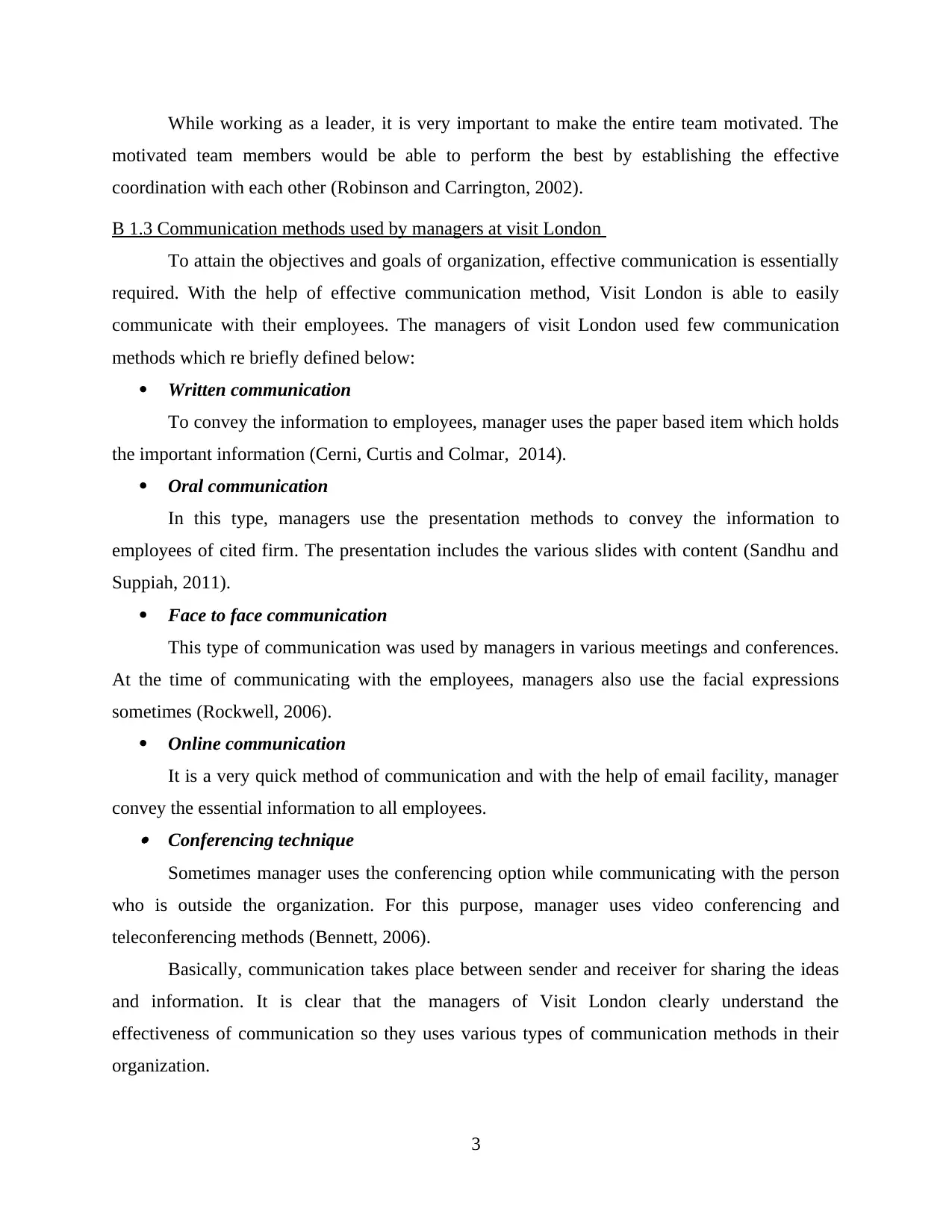
While working as a leader, it is very important to make the entire team motivated. The
motivated team members would be able to perform the best by establishing the effective
coordination with each other (Robinson and Carrington, 2002).
B 1.3 Communication methods used by managers at visit London
To attain the objectives and goals of organization, effective communication is essentially
required. With the help of effective communication method, Visit London is able to easily
communicate with their employees. The managers of visit London used few communication
methods which re briefly defined below:
Written communication
To convey the information to employees, manager uses the paper based item which holds
the important information (Cerni, Curtis and Colmar, 2014).
Oral communication
In this type, managers use the presentation methods to convey the information to
employees of cited firm. The presentation includes the various slides with content (Sandhu and
Suppiah, 2011).
Face to face communication
This type of communication was used by managers in various meetings and conferences.
At the time of communicating with the employees, managers also use the facial expressions
sometimes (Rockwell, 2006).
Online communication
It is a very quick method of communication and with the help of email facility, manager
convey the essential information to all employees. Conferencing technique
Sometimes manager uses the conferencing option while communicating with the person
who is outside the organization. For this purpose, manager uses video conferencing and
teleconferencing methods (Bennett, 2006).
Basically, communication takes place between sender and receiver for sharing the ideas
and information. It is clear that the managers of Visit London clearly understand the
effectiveness of communication so they uses various types of communication methods in their
organization.
3
motivated team members would be able to perform the best by establishing the effective
coordination with each other (Robinson and Carrington, 2002).
B 1.3 Communication methods used by managers at visit London
To attain the objectives and goals of organization, effective communication is essentially
required. With the help of effective communication method, Visit London is able to easily
communicate with their employees. The managers of visit London used few communication
methods which re briefly defined below:
Written communication
To convey the information to employees, manager uses the paper based item which holds
the important information (Cerni, Curtis and Colmar, 2014).
Oral communication
In this type, managers use the presentation methods to convey the information to
employees of cited firm. The presentation includes the various slides with content (Sandhu and
Suppiah, 2011).
Face to face communication
This type of communication was used by managers in various meetings and conferences.
At the time of communicating with the employees, managers also use the facial expressions
sometimes (Rockwell, 2006).
Online communication
It is a very quick method of communication and with the help of email facility, manager
convey the essential information to all employees. Conferencing technique
Sometimes manager uses the conferencing option while communicating with the person
who is outside the organization. For this purpose, manager uses video conferencing and
teleconferencing methods (Bennett, 2006).
Basically, communication takes place between sender and receiver for sharing the ideas
and information. It is clear that the managers of Visit London clearly understand the
effectiveness of communication so they uses various types of communication methods in their
organization.
3
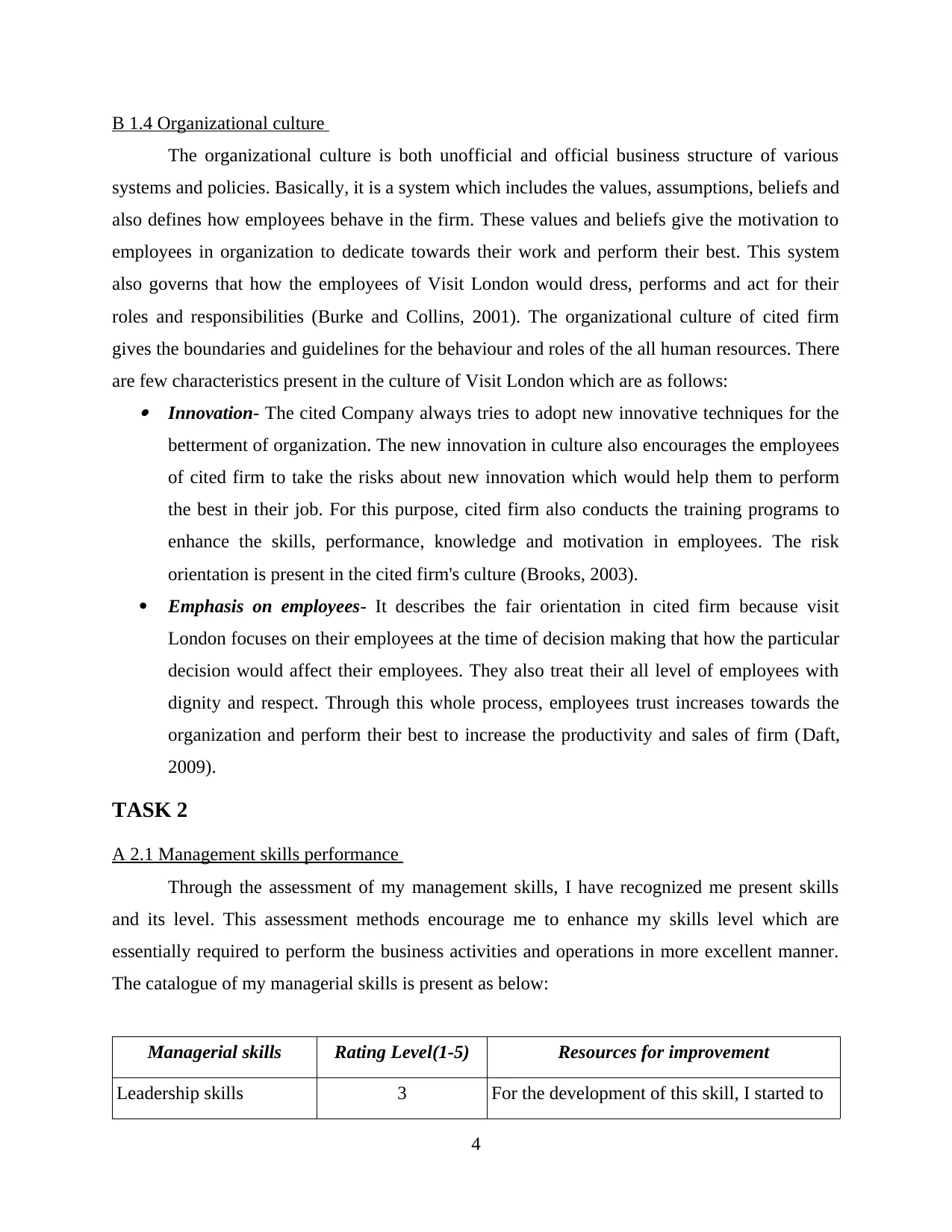
B 1.4 Organizational culture
The organizational culture is both unofficial and official business structure of various
systems and policies. Basically, it is a system which includes the values, assumptions, beliefs and
also defines how employees behave in the firm. These values and beliefs give the motivation to
employees in organization to dedicate towards their work and perform their best. This system
also governs that how the employees of Visit London would dress, performs and act for their
roles and responsibilities (Burke and Collins, 2001). The organizational culture of cited firm
gives the boundaries and guidelines for the behaviour and roles of the all human resources. There
are few characteristics present in the culture of Visit London which are as follows: Innovation- The cited Company always tries to adopt new innovative techniques for the
betterment of organization. The new innovation in culture also encourages the employees
of cited firm to take the risks about new innovation which would help them to perform
the best in their job. For this purpose, cited firm also conducts the training programs to
enhance the skills, performance, knowledge and motivation in employees. The risk
orientation is present in the cited firm's culture (Brooks, 2003).
Emphasis on employees- It describes the fair orientation in cited firm because visit
London focuses on their employees at the time of decision making that how the particular
decision would affect their employees. They also treat their all level of employees with
dignity and respect. Through this whole process, employees trust increases towards the
organization and perform their best to increase the productivity and sales of firm (Daft,
2009).
TASK 2
A 2.1 Management skills performance
Through the assessment of my management skills, I have recognized me present skills
and its level. This assessment methods encourage me to enhance my skills level which are
essentially required to perform the business activities and operations in more excellent manner.
The catalogue of my managerial skills is present as below:
Managerial skills Rating Level(1-5) Resources for improvement
Leadership skills 3 For the development of this skill, I started to
4
The organizational culture is both unofficial and official business structure of various
systems and policies. Basically, it is a system which includes the values, assumptions, beliefs and
also defines how employees behave in the firm. These values and beliefs give the motivation to
employees in organization to dedicate towards their work and perform their best. This system
also governs that how the employees of Visit London would dress, performs and act for their
roles and responsibilities (Burke and Collins, 2001). The organizational culture of cited firm
gives the boundaries and guidelines for the behaviour and roles of the all human resources. There
are few characteristics present in the culture of Visit London which are as follows: Innovation- The cited Company always tries to adopt new innovative techniques for the
betterment of organization. The new innovation in culture also encourages the employees
of cited firm to take the risks about new innovation which would help them to perform
the best in their job. For this purpose, cited firm also conducts the training programs to
enhance the skills, performance, knowledge and motivation in employees. The risk
orientation is present in the cited firm's culture (Brooks, 2003).
Emphasis on employees- It describes the fair orientation in cited firm because visit
London focuses on their employees at the time of decision making that how the particular
decision would affect their employees. They also treat their all level of employees with
dignity and respect. Through this whole process, employees trust increases towards the
organization and perform their best to increase the productivity and sales of firm (Daft,
2009).
TASK 2
A 2.1 Management skills performance
Through the assessment of my management skills, I have recognized me present skills
and its level. This assessment methods encourage me to enhance my skills level which are
essentially required to perform the business activities and operations in more excellent manner.
The catalogue of my managerial skills is present as below:
Managerial skills Rating Level(1-5) Resources for improvement
Leadership skills 3 For the development of this skill, I started to
4
⊘ This is a preview!⊘
Do you want full access?
Subscribe today to unlock all pages.

Trusted by 1+ million students worldwide
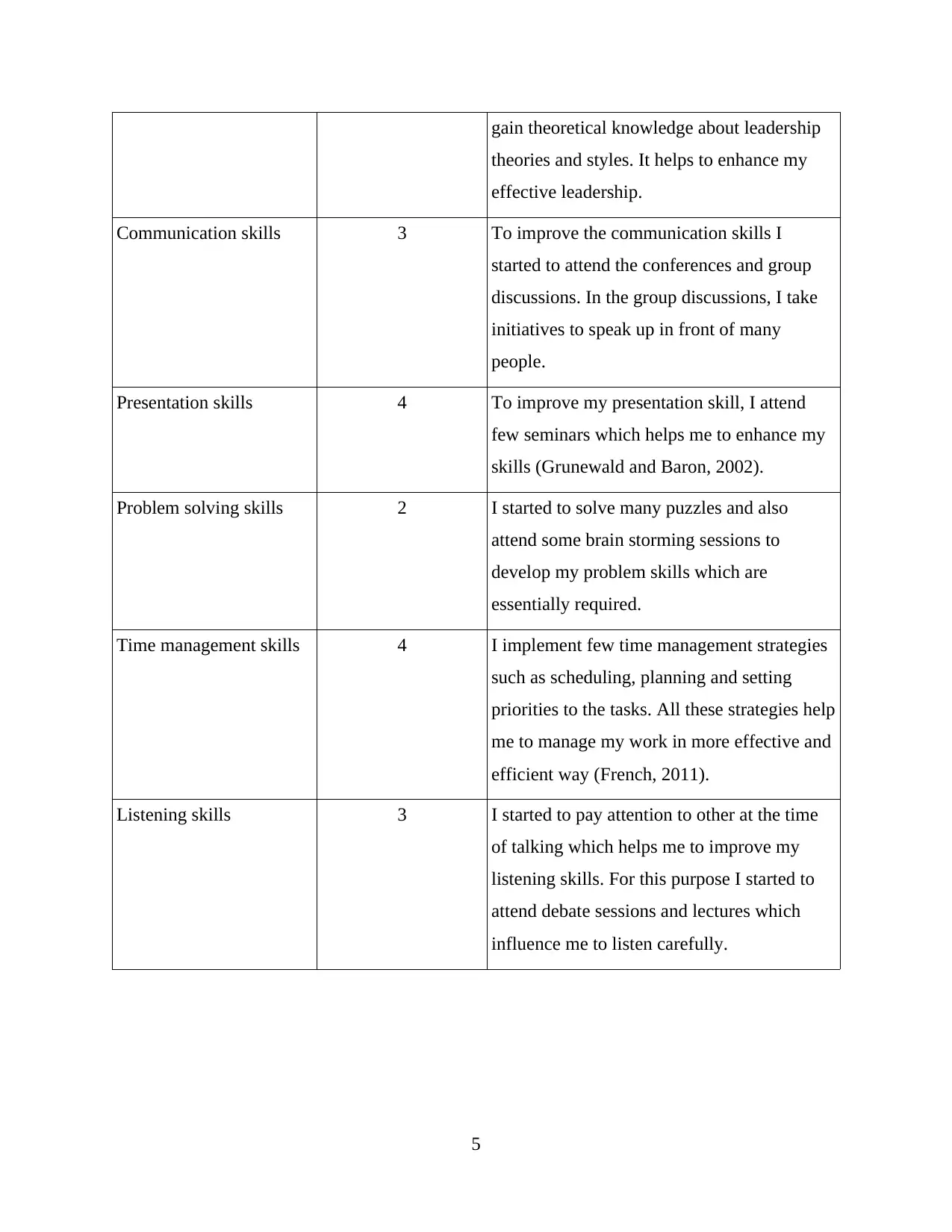
gain theoretical knowledge about leadership
theories and styles. It helps to enhance my
effective leadership.
Communication skills 3 To improve the communication skills I
started to attend the conferences and group
discussions. In the group discussions, I take
initiatives to speak up in front of many
people.
Presentation skills 4 To improve my presentation skill, I attend
few seminars which helps me to enhance my
skills (Grunewald and Baron, 2002).
Problem solving skills 2 I started to solve many puzzles and also
attend some brain storming sessions to
develop my problem skills which are
essentially required.
Time management skills 4 I implement few time management strategies
such as scheduling, planning and setting
priorities to the tasks. All these strategies help
me to manage my work in more effective and
efficient way (French, 2011).
Listening skills 3 I started to pay attention to other at the time
of talking which helps me to improve my
listening skills. For this purpose I started to
attend debate sessions and lectures which
influence me to listen carefully.
5
theories and styles. It helps to enhance my
effective leadership.
Communication skills 3 To improve the communication skills I
started to attend the conferences and group
discussions. In the group discussions, I take
initiatives to speak up in front of many
people.
Presentation skills 4 To improve my presentation skill, I attend
few seminars which helps me to enhance my
skills (Grunewald and Baron, 2002).
Problem solving skills 2 I started to solve many puzzles and also
attend some brain storming sessions to
develop my problem skills which are
essentially required.
Time management skills 4 I implement few time management strategies
such as scheduling, planning and setting
priorities to the tasks. All these strategies help
me to manage my work in more effective and
efficient way (French, 2011).
Listening skills 3 I started to pay attention to other at the time
of talking which helps me to improve my
listening skills. For this purpose I started to
attend debate sessions and lectures which
influence me to listen carefully.
5
Paraphrase This Document
Need a fresh take? Get an instant paraphrase of this document with our AI Paraphraser
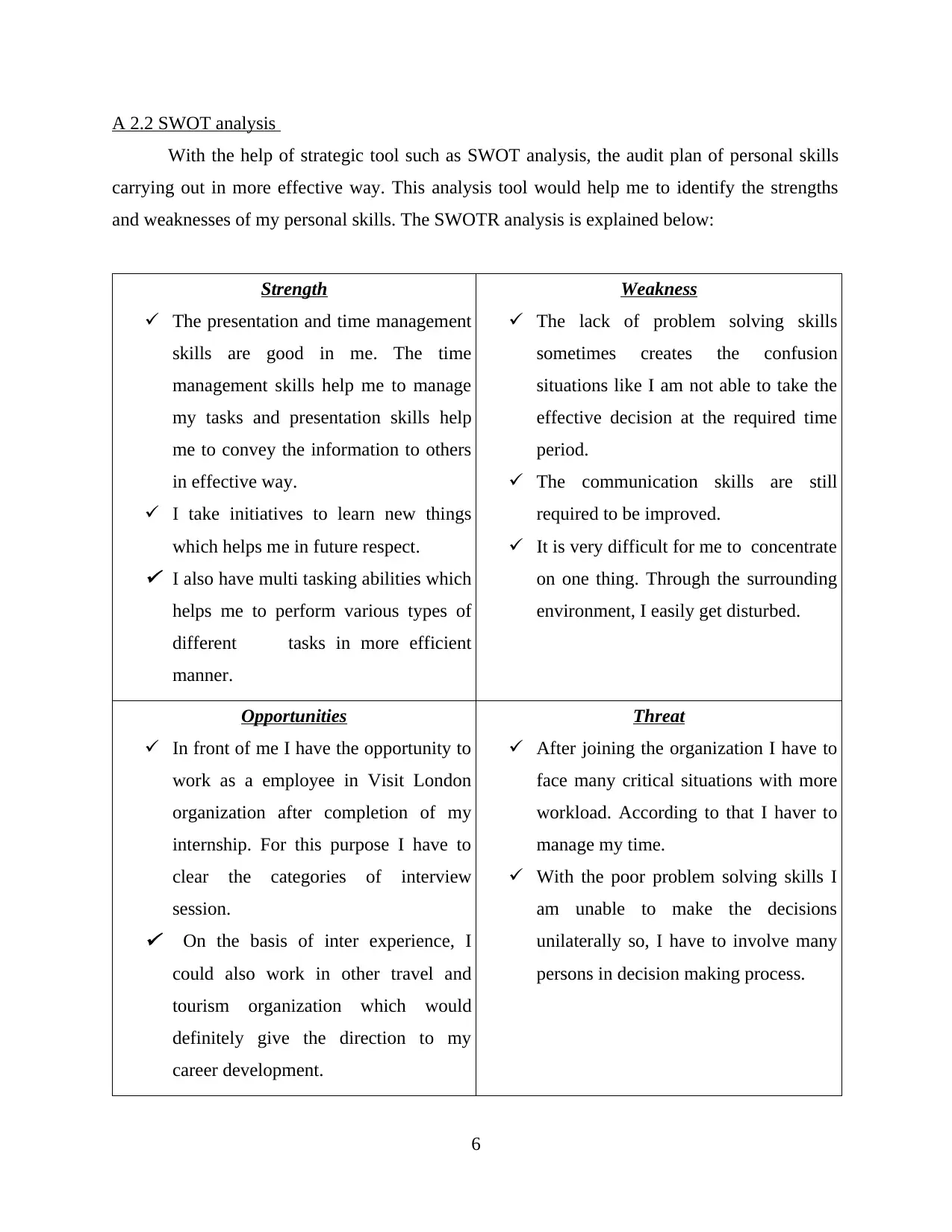
A 2.2 SWOT analysis
With the help of strategic tool such as SWOT analysis, the audit plan of personal skills
carrying out in more effective way. This analysis tool would help me to identify the strengths
and weaknesses of my personal skills. The SWOTR analysis is explained below:
Strength
The presentation and time management
skills are good in me. The time
management skills help me to manage
my tasks and presentation skills help
me to convey the information to others
in effective way.
I take initiatives to learn new things
which helps me in future respect. I also have multi tasking abilities which
helps me to perform various types of
different tasks in more efficient
manner.
Weakness
The lack of problem solving skills
sometimes creates the confusion
situations like I am not able to take the
effective decision at the required time
period.
The communication skills are still
required to be improved.
It is very difficult for me to concentrate
on one thing. Through the surrounding
environment, I easily get disturbed.
Opportunities
In front of me I have the opportunity to
work as a employee in Visit London
organization after completion of my
internship. For this purpose I have to
clear the categories of interview
session. On the basis of inter experience, I
could also work in other travel and
tourism organization which would
definitely give the direction to my
career development.
Threat
After joining the organization I have to
face many critical situations with more
workload. According to that I haver to
manage my time.
With the poor problem solving skills I
am unable to make the decisions
unilaterally so, I have to involve many
persons in decision making process.
6
With the help of strategic tool such as SWOT analysis, the audit plan of personal skills
carrying out in more effective way. This analysis tool would help me to identify the strengths
and weaknesses of my personal skills. The SWOTR analysis is explained below:
Strength
The presentation and time management
skills are good in me. The time
management skills help me to manage
my tasks and presentation skills help
me to convey the information to others
in effective way.
I take initiatives to learn new things
which helps me in future respect. I also have multi tasking abilities which
helps me to perform various types of
different tasks in more efficient
manner.
Weakness
The lack of problem solving skills
sometimes creates the confusion
situations like I am not able to take the
effective decision at the required time
period.
The communication skills are still
required to be improved.
It is very difficult for me to concentrate
on one thing. Through the surrounding
environment, I easily get disturbed.
Opportunities
In front of me I have the opportunity to
work as a employee in Visit London
organization after completion of my
internship. For this purpose I have to
clear the categories of interview
session. On the basis of inter experience, I
could also work in other travel and
tourism organization which would
definitely give the direction to my
career development.
Threat
After joining the organization I have to
face many critical situations with more
workload. According to that I haver to
manage my time.
With the poor problem solving skills I
am unable to make the decisions
unilaterally so, I have to involve many
persons in decision making process.
6
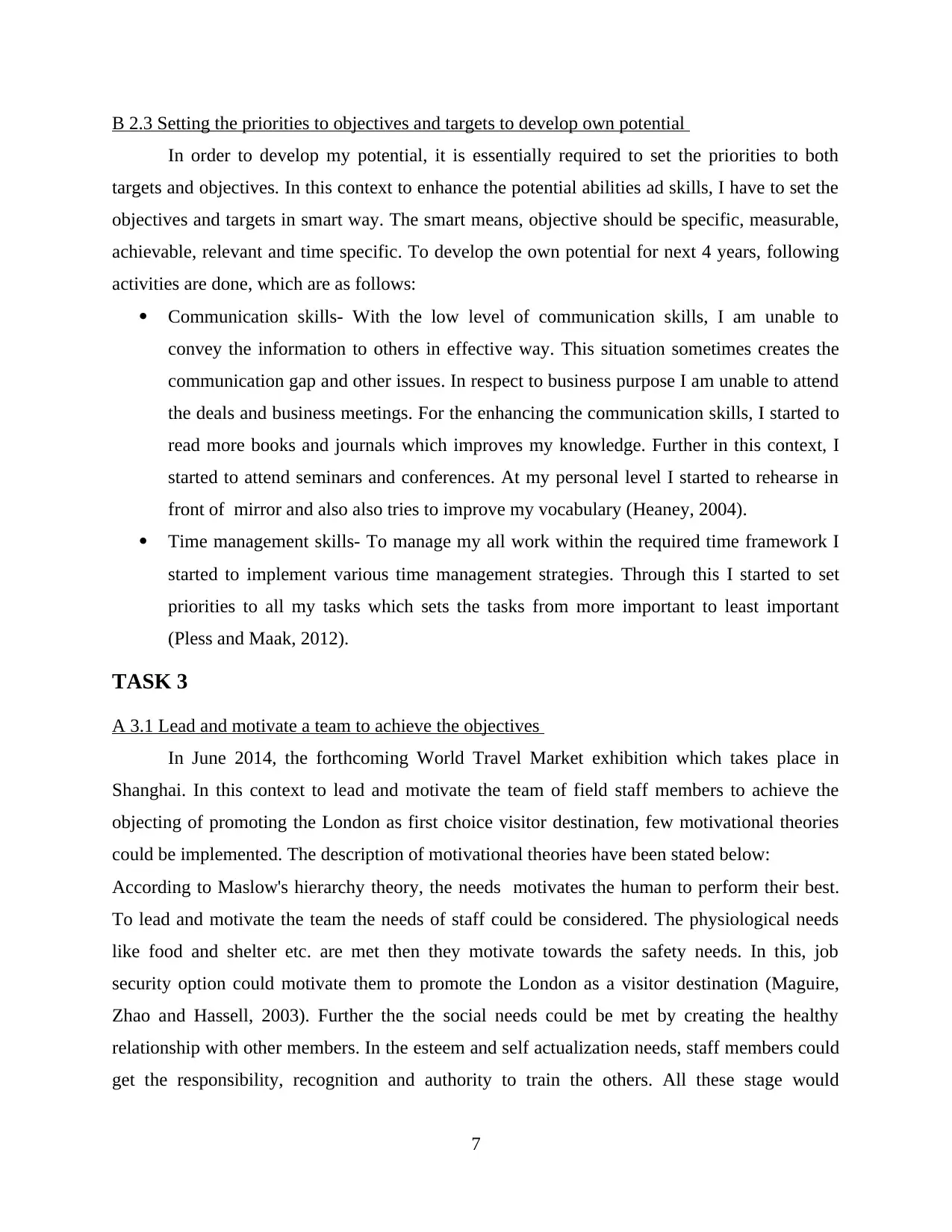
B 2.3 Setting the priorities to objectives and targets to develop own potential
In order to develop my potential, it is essentially required to set the priorities to both
targets and objectives. In this context to enhance the potential abilities ad skills, I have to set the
objectives and targets in smart way. The smart means, objective should be specific, measurable,
achievable, relevant and time specific. To develop the own potential for next 4 years, following
activities are done, which are as follows:
Communication skills- With the low level of communication skills, I am unable to
convey the information to others in effective way. This situation sometimes creates the
communication gap and other issues. In respect to business purpose I am unable to attend
the deals and business meetings. For the enhancing the communication skills, I started to
read more books and journals which improves my knowledge. Further in this context, I
started to attend seminars and conferences. At my personal level I started to rehearse in
front of mirror and also also tries to improve my vocabulary (Heaney, 2004).
Time management skills- To manage my all work within the required time framework I
started to implement various time management strategies. Through this I started to set
priorities to all my tasks which sets the tasks from more important to least important
(Pless and Maak, 2012).
TASK 3
A 3.1 Lead and motivate a team to achieve the objectives
In June 2014, the forthcoming World Travel Market exhibition which takes place in
Shanghai. In this context to lead and motivate the team of field staff members to achieve the
objecting of promoting the London as first choice visitor destination, few motivational theories
could be implemented. The description of motivational theories have been stated below:
According to Maslow's hierarchy theory, the needs motivates the human to perform their best.
To lead and motivate the team the needs of staff could be considered. The physiological needs
like food and shelter etc. are met then they motivate towards the safety needs. In this, job
security option could motivate them to promote the London as a visitor destination (Maguire,
Zhao and Hassell, 2003). Further the the social needs could be met by creating the healthy
relationship with other members. In the esteem and self actualization needs, staff members could
get the responsibility, recognition and authority to train the others. All these stage would
7
In order to develop my potential, it is essentially required to set the priorities to both
targets and objectives. In this context to enhance the potential abilities ad skills, I have to set the
objectives and targets in smart way. The smart means, objective should be specific, measurable,
achievable, relevant and time specific. To develop the own potential for next 4 years, following
activities are done, which are as follows:
Communication skills- With the low level of communication skills, I am unable to
convey the information to others in effective way. This situation sometimes creates the
communication gap and other issues. In respect to business purpose I am unable to attend
the deals and business meetings. For the enhancing the communication skills, I started to
read more books and journals which improves my knowledge. Further in this context, I
started to attend seminars and conferences. At my personal level I started to rehearse in
front of mirror and also also tries to improve my vocabulary (Heaney, 2004).
Time management skills- To manage my all work within the required time framework I
started to implement various time management strategies. Through this I started to set
priorities to all my tasks which sets the tasks from more important to least important
(Pless and Maak, 2012).
TASK 3
A 3.1 Lead and motivate a team to achieve the objectives
In June 2014, the forthcoming World Travel Market exhibition which takes place in
Shanghai. In this context to lead and motivate the team of field staff members to achieve the
objecting of promoting the London as first choice visitor destination, few motivational theories
could be implemented. The description of motivational theories have been stated below:
According to Maslow's hierarchy theory, the needs motivates the human to perform their best.
To lead and motivate the team the needs of staff could be considered. The physiological needs
like food and shelter etc. are met then they motivate towards the safety needs. In this, job
security option could motivate them to promote the London as a visitor destination (Maguire,
Zhao and Hassell, 2003). Further the the social needs could be met by creating the healthy
relationship with other members. In the esteem and self actualization needs, staff members could
get the responsibility, recognition and authority to train the others. All these stage would
7
⊘ This is a preview!⊘
Do you want full access?
Subscribe today to unlock all pages.

Trusted by 1+ million students worldwide
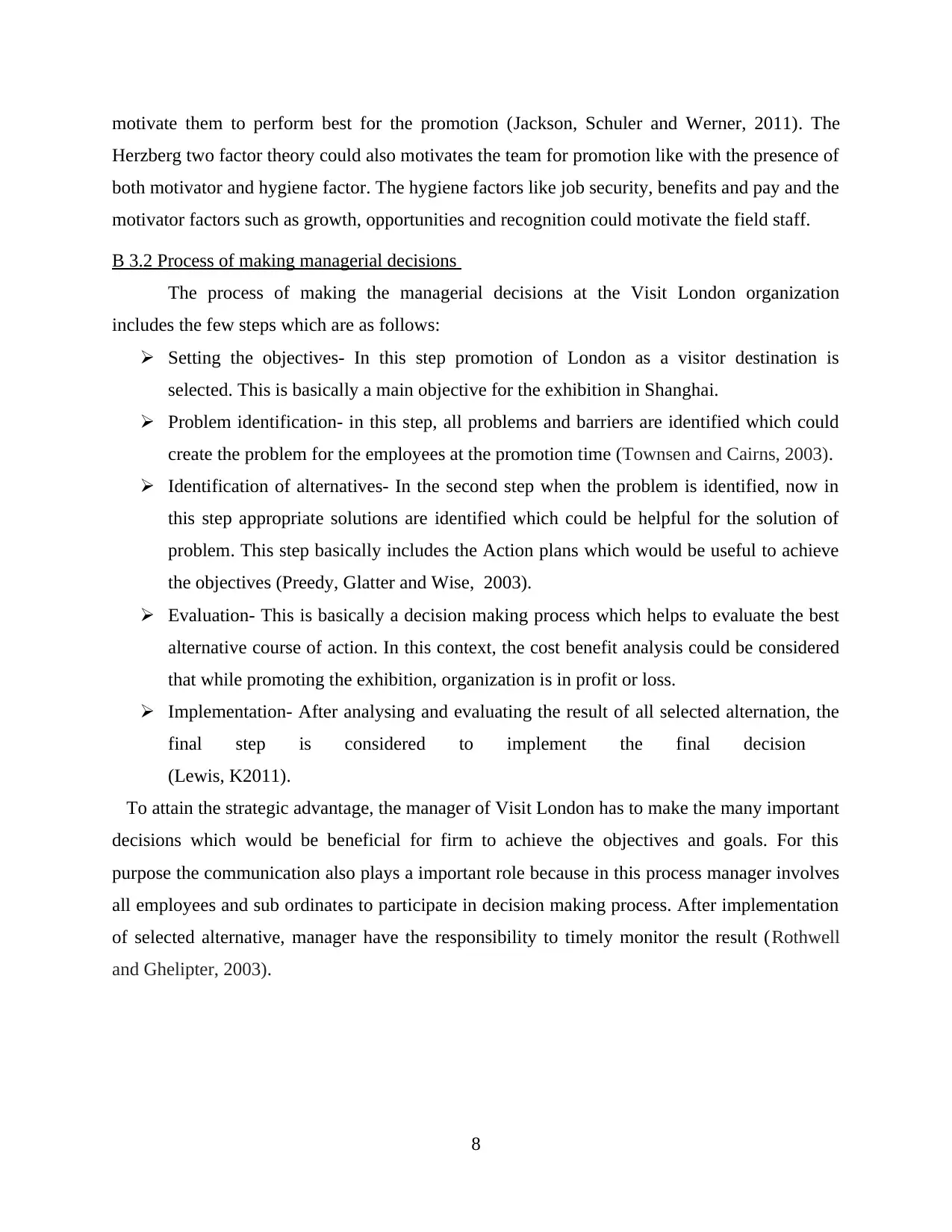
motivate them to perform best for the promotion (Jackson, Schuler and Werner, 2011). The
Herzberg two factor theory could also motivates the team for promotion like with the presence of
both motivator and hygiene factor. The hygiene factors like job security, benefits and pay and the
motivator factors such as growth, opportunities and recognition could motivate the field staff.
B 3.2 Process of making managerial decisions
The process of making the managerial decisions at the Visit London organization
includes the few steps which are as follows:
Setting the objectives- In this step promotion of London as a visitor destination is
selected. This is basically a main objective for the exhibition in Shanghai.
Problem identification- in this step, all problems and barriers are identified which could
create the problem for the employees at the promotion time (Townsen and Cairns, 2003).
Identification of alternatives- In the second step when the problem is identified, now in
this step appropriate solutions are identified which could be helpful for the solution of
problem. This step basically includes the Action plans which would be useful to achieve
the objectives (Preedy, Glatter and Wise, 2003).
Evaluation- This is basically a decision making process which helps to evaluate the best
alternative course of action. In this context, the cost benefit analysis could be considered
that while promoting the exhibition, organization is in profit or loss.
Implementation- After analysing and evaluating the result of all selected alternation, the
final step is considered to implement the final decision
(Lewis, K2011).
To attain the strategic advantage, the manager of Visit London has to make the many important
decisions which would be beneficial for firm to achieve the objectives and goals. For this
purpose the communication also plays a important role because in this process manager involves
all employees and sub ordinates to participate in decision making process. After implementation
of selected alternative, manager have the responsibility to timely monitor the result (Rothwell
and Ghelipter, 2003).
8
Herzberg two factor theory could also motivates the team for promotion like with the presence of
both motivator and hygiene factor. The hygiene factors like job security, benefits and pay and the
motivator factors such as growth, opportunities and recognition could motivate the field staff.
B 3.2 Process of making managerial decisions
The process of making the managerial decisions at the Visit London organization
includes the few steps which are as follows:
Setting the objectives- In this step promotion of London as a visitor destination is
selected. This is basically a main objective for the exhibition in Shanghai.
Problem identification- in this step, all problems and barriers are identified which could
create the problem for the employees at the promotion time (Townsen and Cairns, 2003).
Identification of alternatives- In the second step when the problem is identified, now in
this step appropriate solutions are identified which could be helpful for the solution of
problem. This step basically includes the Action plans which would be useful to achieve
the objectives (Preedy, Glatter and Wise, 2003).
Evaluation- This is basically a decision making process which helps to evaluate the best
alternative course of action. In this context, the cost benefit analysis could be considered
that while promoting the exhibition, organization is in profit or loss.
Implementation- After analysing and evaluating the result of all selected alternation, the
final step is considered to implement the final decision
(Lewis, K2011).
To attain the strategic advantage, the manager of Visit London has to make the many important
decisions which would be beneficial for firm to achieve the objectives and goals. For this
purpose the communication also plays a important role because in this process manager involves
all employees and sub ordinates to participate in decision making process. After implementation
of selected alternative, manager have the responsibility to timely monitor the result (Rothwell
and Ghelipter, 2003).
8
Paraphrase This Document
Need a fresh take? Get an instant paraphrase of this document with our AI Paraphraser
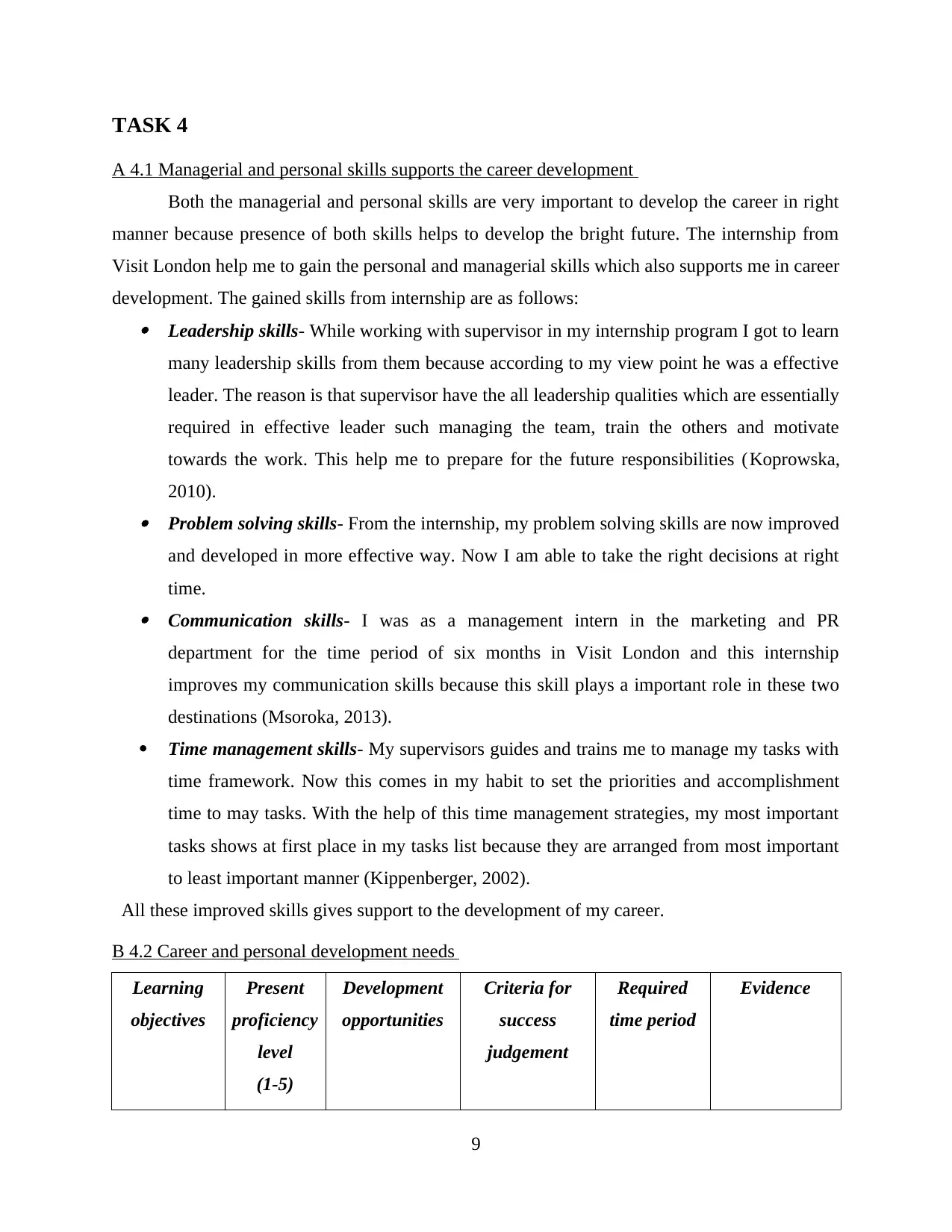
TASK 4
A 4.1 Managerial and personal skills supports the career development
Both the managerial and personal skills are very important to develop the career in right
manner because presence of both skills helps to develop the bright future. The internship from
Visit London help me to gain the personal and managerial skills which also supports me in career
development. The gained skills from internship are as follows: Leadership skills- While working with supervisor in my internship program I got to learn
many leadership skills from them because according to my view point he was a effective
leader. The reason is that supervisor have the all leadership qualities which are essentially
required in effective leader such managing the team, train the others and motivate
towards the work. This help me to prepare for the future responsibilities (Koprowska,
2010). Problem solving skills- From the internship, my problem solving skills are now improved
and developed in more effective way. Now I am able to take the right decisions at right
time. Communication skills- I was as a management intern in the marketing and PR
department for the time period of six months in Visit London and this internship
improves my communication skills because this skill plays a important role in these two
destinations (Msoroka, 2013).
Time management skills- My supervisors guides and trains me to manage my tasks with
time framework. Now this comes in my habit to set the priorities and accomplishment
time to may tasks. With the help of this time management strategies, my most important
tasks shows at first place in my tasks list because they are arranged from most important
to least important manner (Kippenberger, 2002).
All these improved skills gives support to the development of my career.
B 4.2 Career and personal development needs
Learning
objectives
Present
proficiency
level
(1-5)
Development
opportunities
Criteria for
success
judgement
Required
time period
Evidence
9
A 4.1 Managerial and personal skills supports the career development
Both the managerial and personal skills are very important to develop the career in right
manner because presence of both skills helps to develop the bright future. The internship from
Visit London help me to gain the personal and managerial skills which also supports me in career
development. The gained skills from internship are as follows: Leadership skills- While working with supervisor in my internship program I got to learn
many leadership skills from them because according to my view point he was a effective
leader. The reason is that supervisor have the all leadership qualities which are essentially
required in effective leader such managing the team, train the others and motivate
towards the work. This help me to prepare for the future responsibilities (Koprowska,
2010). Problem solving skills- From the internship, my problem solving skills are now improved
and developed in more effective way. Now I am able to take the right decisions at right
time. Communication skills- I was as a management intern in the marketing and PR
department for the time period of six months in Visit London and this internship
improves my communication skills because this skill plays a important role in these two
destinations (Msoroka, 2013).
Time management skills- My supervisors guides and trains me to manage my tasks with
time framework. Now this comes in my habit to set the priorities and accomplishment
time to may tasks. With the help of this time management strategies, my most important
tasks shows at first place in my tasks list because they are arranged from most important
to least important manner (Kippenberger, 2002).
All these improved skills gives support to the development of my career.
B 4.2 Career and personal development needs
Learning
objectives
Present
proficiency
level
(1-5)
Development
opportunities
Criteria for
success
judgement
Required
time period
Evidence
9
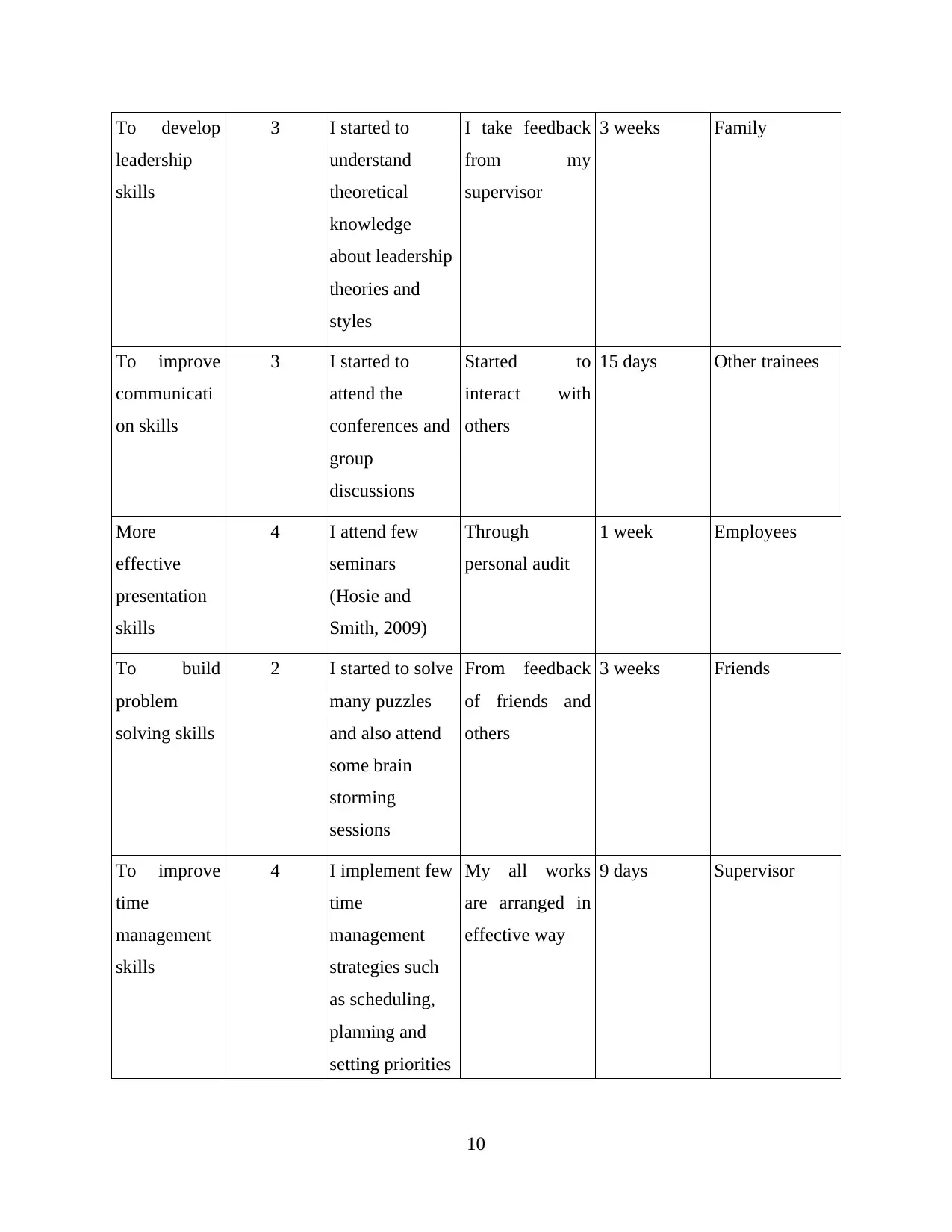
To develop
leadership
skills
3 I started to
understand
theoretical
knowledge
about leadership
theories and
styles
I take feedback
from my
supervisor
3 weeks Family
To improve
communicati
on skills
3 I started to
attend the
conferences and
group
discussions
Started to
interact with
others
15 days Other trainees
More
effective
presentation
skills
4 I attend few
seminars
(Hosie and
Smith, 2009)
Through
personal audit
1 week Employees
To build
problem
solving skills
2 I started to solve
many puzzles
and also attend
some brain
storming
sessions
From feedback
of friends and
others
3 weeks Friends
To improve
time
management
skills
4 I implement few
time
management
strategies such
as scheduling,
planning and
setting priorities
My all works
are arranged in
effective way
9 days Supervisor
10
leadership
skills
3 I started to
understand
theoretical
knowledge
about leadership
theories and
styles
I take feedback
from my
supervisor
3 weeks Family
To improve
communicati
on skills
3 I started to
attend the
conferences and
group
discussions
Started to
interact with
others
15 days Other trainees
More
effective
presentation
skills
4 I attend few
seminars
(Hosie and
Smith, 2009)
Through
personal audit
1 week Employees
To build
problem
solving skills
2 I started to solve
many puzzles
and also attend
some brain
storming
sessions
From feedback
of friends and
others
3 weeks Friends
To improve
time
management
skills
4 I implement few
time
management
strategies such
as scheduling,
planning and
setting priorities
My all works
are arranged in
effective way
9 days Supervisor
10
⊘ This is a preview!⊘
Do you want full access?
Subscribe today to unlock all pages.

Trusted by 1+ million students worldwide
1 out of 15
Related Documents
Your All-in-One AI-Powered Toolkit for Academic Success.
+13062052269
info@desklib.com
Available 24*7 on WhatsApp / Email
![[object Object]](/_next/static/media/star-bottom.7253800d.svg)
Unlock your academic potential
Copyright © 2020–2026 A2Z Services. All Rights Reserved. Developed and managed by ZUCOL.





